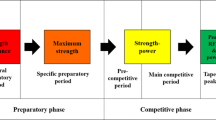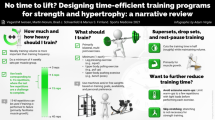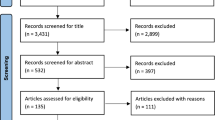Abstract
Stretch–shortening cycle (SSC)-type fatigue is associated with acute and delayed functional defects, and appears to be a useful model to reveal the flexibility of both central and reflex adjustments to the contractile failure. SSC fatigue was induced in an experimental (EXP) group (n=6) on a sledge ergometer with an exhaustive rebound exercise with submaximal effort. The acute (POST) and 2-day delayed (2D) neuromuscular changes with fatigue were examined in a short submaximal rebound task (REBOUND) and in a maximal isometric plantarflexion test (ISOM). The EXP group results were compared to those of a control group (n=6) who did not perform the exhaustive SSC exercise and did not present any change in the tests. In the EXP group, the ISOM test revealed mostly a large decrease in maximal plantarflexion force at 2D that was correlated with the reduced mean soleus muscle (SOL) activation. Indicating “task-dependent” fatigue effects on the neural changes, the REBOUND test revealed both acute and delayed increases in SOL activation. Supporting central neural changes, SOL preactivation increased in POST and 2D. The neural flexibility along time and across muscles was demonstrated by the shifted increase in SOL activation from the braking phase in POST to the push-off phase in 2D, and associated increased gastrocnemius medialis preactivation in 2D. In contrast, activation during the stretch–reflex period was constant in POST, and decreased in 2D. These results would support the influence of musculotendinous afferents on the flexible neural adjustments to the SSC-induced contractile failure.








Similar content being viewed by others
References
Avela J, Komi PV (1998) Reduced stretch reflex sensitivity and muscle stiffness after long-lasting stretch–shortening cycle exercise in humans. Eur J Appl Physiol 78:403–410
Avela J, Santos PM, Kyröläinen H, Komi PV (1994) Effects of different simulated gravity conditions on neuromuscular control in drop jump exercises. Aviat Space Environ Med 65:301–308
Avela J, Santos PM, Komi PV (1996) Effects of differently induced stretch loads on neuromuscular control in drop jump exercises. Eur J Appl Physiol 72:553–562
Avela J, Kyröläinen H, Komi PV, Rama D (1999) Reduced reflex sensitivity persists several days after long-lasting stretch–shortening cycle exercise. J Appl Physiol 86:1292–1300
Balestra C, Duchateau J, Hainaut K (1991) Effects of fatigue on the stretch reflex in a human muscle. Electroencephalogr Clin Neurophysiol 85:46–52
Bigland-Ritchie BR, Dawson NJ, Johansson RS, Lippold OC (1986) Reflex origin for the slowing of motoneurone firing rates in fatigue of human voluntary contractions. J Physiol (Lond) 379:451–459
Brockett C, Warren N, Gregory JE, Morgan DL, Proske U (1997) A comparison of the effects of concentric versus eccentric exercise on force and position sense at the human elbow joint. Brain Res 771:251–258
Cheung K, Hume P, Maxwell L (2003) Delayed onset muscle soreness: treatment strategies and performance factors. Sports Med 33:145–64
Chleboun, GS, Hoxell JN, Conatser RR, Giesey JJ (1998) Relationship between muscle swelling and stiffness after eccentric exercise. Med Sci Sports Exerc 30:529–535
Clarkson PM, Nosaka K, Braun B (1992) Muscle function after exercise-induced muscle damage and rapid adaptation. Med Sci Sports Exerc 24:512–520
Dietz V (1992) Human neuronal control of automatic functional movements: interaction between central programs and afferent input. Physiol Rev 72:33–69
Dousset E, Ishikawa M, Kyröläinen H, Kallio J, Kuitunen S, Linnamo V, Avela J, Komi PV (2003) Bimodal recovery from exhaustive stretch-shortening cycle exercise. In: Abstracts of the 8th annual congress of the European College of Sport Science, Salzburg, Austria, 9–12 July 2003
Duchateau J, Hainaut K (1993) Behaviour of short and long latency reflexes in fatigued human muscles. J Physiol (Lond) 471:787–799
Gandevia SC (2001) Spinal and supraspinal factors in human muscle fatigue. Physiol Rev 81:1725–1789
Gollhofer A, Kyröläinen H (1991) Neuromuscular control of the human leg extensor muscles in jump exercises under various stretch-load conditions. Int J Sports Med 12:34–40
Gollhofer A, Komi PV, Miyashita M, Aura O (1987a) Fatigue during stretch–shortening cycle exercises: changes in mechanical performance of human skeletal muscle. Int J Sports Med 8:71–78
Gollhofer A, Komi PV, Fujitsuka N, Miyashita M (1987b) Fatigue during stretch-shortening cycle exercises: II. Changes in neuromuscular activation patterns of human skeletal muscle. Int J Sports Med 8[Suppl1]:38–47
Gregory JE, Brockett CL, Morgan DL, Whitehead NP, Proske U (2002) Effect of eccentric muscle contractions on Golgi tendon organ responses to passive and active tension in the cat. J Physiol (Lond) 538:209–218
Gregory JE, Morgan DL, Proske U (2003) Tendon organs as monitors of muscle damage from eccentric contractions. Exp Brain Res 151:346–355
Gregory JE, Morgan DL, Proske U (2004) Responses of muscle spindles following a series of eccentric contractions. Exp Brain Res 157:234–240
Horita T (2000) Stiffness regulation during stretch–shortening cycle exercise. PhD thesis, Department of Biology of Physical Activity, University of Jyväskylä, Finland
Horita T, Komi PV, Nicol N, Kyröläinen H (1996) Stretch shortening cycle fatigue: interactions among joint stiffness, reflex, and muscle mechanical performance in the drop jump. Eur J Appl Physiol 73:393–403
Horita T, Komi PV, Nicol C, Kyröläinen H (1999). Effect of exhausting stretch–shortening cycle exercise on the time course of mechanical behaviour in the drop jump: possible role of muscle damage. Eur J Appl Physiol 79:160–167
Horita T, Komi PV, Nicol C, Kyröläinen H (2002) Interaction between pre-landing activities and stiffness regulation of the knee joint musculoskeletal in the drop jump: implications to performance. Eur J Appl Physiol 88:76–84
Horita T, Komi PV, Hämäläinen I, Avela J (2003) Exhausting stretch–shortening cycle (SSC) exercise causes greater impairment in SSC performance than in pure concentric performance. Eur J Appl Physiol 88:527–534
Howell JN, Chleboun G, Conatser R (1993) Muscle stiffness, strength loss, swelling and soreness following exercise-induced injury in humans. J Physiol (Lond) 464:183–196
Komi PV (2000) Stretch–shortening cycle: a powerful model to study normal and fatigued muscle. J Biomech 33:1197–1206
Komi PV, Gollhofer A (1997) Stretch reflex can have an important role in force enhancement during SSC-exercise. J Appl Biomech 33:1197–1206
Komi PV, Gollhofer A, Schmidtbleicher D, Frick U (1987) Interaction between man and shoe in running: considerations for more comprehensive measurement approach. Int J Sports Med 8:196–202
Kuitunen S, Avela J, Nicol C, Komi PV (2002) Acute and prolonged reduction in joint stiffness in humans after exhausting stretch-shortening cycle exercise. Eur J Appl Physiol 88:107–116
Kuitunen S, Avela J, Kyrolaïnen H, Komi PV (2003) Voluntary activation and mechanical performance of human triceps surae muscle after exhaustive stretch–shortening cycle jumping exercise. Eur J Appl Physiol 91:538–544
Kyröläinen H, Komi PV, Oksanen P, Häkkinen K, Chen S, Kim DH (1990) Mechanical efficiency of locomotion in females during different kinds of muscle actions. Eur J Appl Physiol 61:446–452
Lee RG, Tatton WG (1982) Long loop reflexes in man: Clinical applications. In: Desmedt JE (ed) Cerebral motor control in man: long loop mechanism. Progress in clinical neurophysiology, vol 4. Karger, Basel, pp 334–341
Melvill Jones G, Watt D (1971) Observation on control of jumping and hopping movements in man. J Physiol (Lond) 219:709–727
Nicol C, Komi PV (2003) Stretch–shortening cycle fatigue and its influence on force and power production. In: Komi PV (ed) Strength and power in sport. Blackwell, Oxford, pp 203–228
Nicol C, Komi PV, Marconnet P (1991a) Fatigue effects of marathon running on neuromuscular performance I: Changes in muscle force and stiffness characteristics. Scand J Med Sci Sports 1:10–17
Nicol C, Komi PV, Marconnet P (1991b) Effects of marathon fatigue on running kinematics and economy. Scand J Med Sci Sports 1:195–204
Nicol C, Komi PV, Horita T, Kyröläinen H, Takala TES (1996a) Reduced stretch-reflex sensitivity after exhaustive stretch-shortening cycle exercise. Eur J Appl Physiol 72:401–409
Nicol C, Komi PV, Avela J (1996b) Stretch-shortening cycle fatigue reduces stretch-reflex response. In: Abstracts of the 1996 International Pre-Olympic Scientific Congress, Dallas, Texas, 7–10 July 1996
Nicol C, Kuitunen S, Kyröläinen H, Avela J, Komi PV (2003) Effects of long- and short-term fatiguing stretch-shortening cycle exercises on reflex EMG and force of the tendon-muscle complex. Eur J Appl Physiol 90:470–479
Nosaka K, Clarkson PM (1995) Muscle damage following repeated bouts of high force eccentric exercise. Med Sci Sports Exerc 27:1263–1269
Patla AE (1987) Some neuromuscular strategies characterizing adaptation process during prolonged activity in humans. Can J Sport Sci 12[Suppl 1]:33S–44S
Rossi A, Decchi B, Ginanneschi F (1999) Presynaptic excitability changes of group Ia fibres to muscle nociceptive stimulation in humans. Brain Res 818:12–22
Schmidtbleicher D, Gollhofer A (1982) NeuromuskuläreUntersuchungen zur Bestimmung individueller Belastungsgrössen fur ein Tieftsprungtraining. Leistungsport 12:298–307
Strojnik V, Nicol C, Komi PV (2001) Fatigue during one-week tourist alpine skiing. In: Müller E, Schwameder H, Raschner C, Lindinger S, Kornexl E (eds) Science and skiing II. Kovač, Hamburg, pp 599–607
Surface EMG for the non-invasive assessment of muscles (SENIAM) (1999) In: Hermens H, Freriks B, Merletti R, Stegeman D, Blok J, Rau G, Disselhorst-Klug C, Hägg G (eds) European recommendations for surface electromyography. RRD, The Netherlands
Toft E, Sinkjaer T, Andreassen S, Larsen K (1991) Mechanical and electromyographic responses to stretch of the human ankle extensors. J Neurophysiol 65:1402–1410
Travell J, Rinzler S, Herman M (1942) Pain and disability of the shoulder and the arm. Treatment by intramuscular infiltration with procaine hydrochloride. JAMA 120:417–422
Whitehead NP, Gregory JE, Morgan DL, Proske U (2001) Passive mechanical properties of the medial gastrocnemius muscle of the cat. J Physiol (Lond) 536:893–903
Acknowledgement
The authors gratefully acknowledge Professor P.V. Komi for criticism of the first version of this manuscript.
Author information
Authors and Affiliations
Corresponding author
Rights and permissions
About this article
Cite this article
Regueme, S.C., Nicol, C., Barthèlemy, J. et al. Acute and delayed neuromuscular adjustments of the triceps surae muscle group to exhaustive stretch–shortening cycle fatigue. Eur J Appl Physiol 93, 398–410 (2005). https://doi.org/10.1007/s00421-004-1221-3
Accepted:
Published:
Issue Date:
DOI: https://doi.org/10.1007/s00421-004-1221-3




